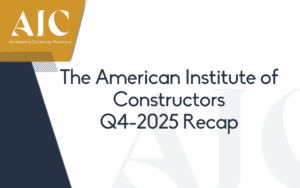So you’ve just received your degree in Construction Management, and it’s time to enter the workforce! Before you can lead a project, you’ll need to go through the interview process. Want to know what to expect? AIC is here to help.
When you go in for an interview, whether in-person, over a video call, or on the phone, chances are the bulk of your time will be spent answering questions. The hiring manager wants to know what your working style is like and how you might deal with a number of common situations.
Take a look at our list of construction project manager interview questions you can expect to be asked. Being prepared will help increase your chances of acing the interview and being hired.
5 Common Construction Project Manager Interview Questions
It helps to have a few answers ready so you can put your best foot forward. But what questions will you be asked during the interview? Here are a few examples that might come up.
1. Sample Question on Leadership
Describe your leadership style. How would you approach a project that requires multiple roles to work seamlessly?
How to Answer
As a Construction Project Manager, demonstrating leadership is at the core of your work. Therefore, it’s important to highlight and link your abilities to successfully completing managerial duties. Talk to your strengths and address the following:
1. How you give/receive feedback and criticism.
2. Your organizational plan and how it factors in workers.
3. Give an example from the past where you were an effective leader. Talk about how it made a difference to a person or project.
2. Sample Question on Conflict
How do you handle conflict with superiors and team members?
How to Answer:
Knowing how to deal with conflict in the workplace – and how to diffuse tense situations with ease – is the key to creating a productive environment where everyone feels comfortable.
When asked this type of question, stress the importance of communication. Talk about the ways in which you can prevent avoidable conflict or confidently lean into situations where there is natural conflict. Being proactive and sure of yourself as a leader is an excellent way to keep things running smoothly while increasing morale.
But don’t forget to answer the question! When dealing with superiors and team members, the best resolution will often come from listening and setting aside your ego to ensure everyone is heard. Then, after you have a grasp of what the problem is, you can work together to form a solution.
– In the case of superiors, it’s okay to voice your opinions if you think what you have to say has merit, such as when you identify an ethical issue. Talk to the interviewer about how you would handle this delicate situation.
– For team members, you want to do your best to make sure they feel like their voice is heard, but don’t feel like you have to take every suggestion if it doesn’t align with your managerial plan. Talk about how you would balance respecting each worker’s perspective and asserting your authority as project manager.
3. Sample Question on Insubordination
If a worker or contractor disregarded your instructions for their part of the project, how would you respond?
How to Answer:
As a manager, you will work hard to make sure each phase of a project goes smoothly so that the next one can begin on time and on budget. When workers or contractors disregard your instructions, that can mean delays at best and accidents or injury at worst.
In this case, it’s best to go in with a cool head and ask the person why they operated on their own instead of according to your plan. Perhaps they have a good reason, had to make a game-time decision, or are used to doing it differently.
Regardless of whether things went smoothly, it’s important to talk through the events and ensure that the worker is on the same page with you. Remember, communicating effectively is crucial. If there was a larger issue that the worker wasn’t aware of, it’s essential to explain why their course of action was a mistake and to detail the consequences it brought about.
During the interview, talk about the steps you would go through to identify, address, and rectify the problem so the project can move forward in a positive direction.
4. Sample Question on Teamwork
Do you work better independently or as part of a team?
How to Answer:
The best way to answer this question is to dissect it and play both sides against each other. Saying you work better independently but not as part of a team will come off as elitist or make you seem like you’re not good with people. On the other hand, committing to only being part of a team will make it seem like you can’t handle singular decision-making roles like a Project Manager.
Instead, talk about your strengths in both settings. Saying you can work effectively as part of a team and also as a leader will show the interviewer that you would be a versatile addition to the company.
5. Sample Question on Experience
What kind of projects do you have experience with?
How to Answer:
This question requires some pre-planning. Before you go into the interview, you should make a list of the projects you’ve worked on and detail the roles you played in their completion.
During the interview, talk about the successes and challenges of each project and how you were integral in helping complete each job. Having a few key examples will help illustrate your background and make your resume come to life.
Just starting out? Think about what you learned in your Construction Management program and the projects you participated in to complete your degree. Link your knowledge to real-world experiences to show the interviewer you can transfer what you learned in the classroom to the job site.
Of course, which questions your interviewer will ask will ultimately depend on the role offered, the hiring company, and your expertise level. Use these as a guide in structuring your interview preparation.
Follow-Up Questions During a Job Interview
Sometimes, the hardest question in an interview is when the hiring manager turns the tables and asks if you have anything to ask about the job or the company. It helps to be prepared for this inevitability! If you have questions about specifics, it will let the interviewer know that you’ve done your homework and are really invested in the position.
Here are a few examples to get you started.
Work/Life Balance
How important is your personal life to this company? Do they prioritize family and time off so that their employees are healthier, happier, and more effective?
Look for information about the company culture on the company’s website before heading to the interview. Being informed about the company’s values will show that you are carefully evaluating how they operate and want to learn more about specific topics.
Salary/Vacation
It’s not taboo to talk about pay! Knowing how much the position offers is important and well within your purview. Make sure the compensation lines up with what you need and expect.
To help you out, it would beneficial to take a look at similar positions in your area and find the average salary for someone with your existing knowledge and experience. Knowing the market will help you have a great conversation about salary that doesn’t feel awkward.
Day-to-Day Run-Through
Although much of the work will align with what you learned in your degree program, each company has its own schedules and ways of doing things.
Ask about typical days on and off the job site. Try to get a sense of what to expect if hired to the role you are applying for. This information will help make sure the job is a fit for your skills and experience.
Overall Takeaway
The main point is to be as prepared as possible. You might answer your own questions beforehand during your pre-interview research. But your research may also trigger additional follow-up questions that you would like the company representative to expand on during the interview.
And, if all of your prepared questions are answered during the course of the interview, go through them briefly and check them off with the interviewer so that they can see what topics you were incredibly excited about. Be conversational. Don’t be afraid to respond courteously, such as, “Well, I think you did a great job answering everything for me!”
Learn More About Preparing for the Workforce
Need some guidance when it comes to entering the workforce as a construction project manager? Consider joining AIC!
As a member of our organization, you will have access to industry professionals with years of experience who have been through the interview process on both sides. They can provide you with valuable insights on construction project manager interview questions and how to get started on your career path.
– We also invite you to follow AIC on LinkedIn. Gain access to construction management insights and find out more about hot topics in the industry that will pertain to your role.




